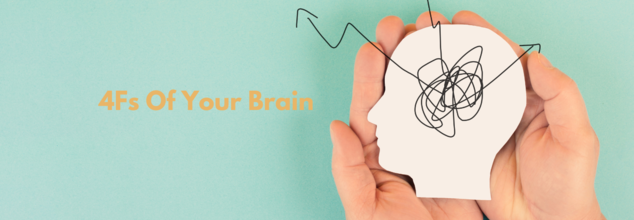
The 4 Fs Of Your Brain: How Your Mind Reacts To Trauma
Trauma is the brain's normal reaction to stressful or dangerous circumstances that are frequently beyond our control. The brain uses one of the "4 Fs"—Flight, Fight, Freeze, and Fawn—an automatic, defensive response to live.
These reactions show several coping strategies, each with its own set of actions and feelings. Recognising and treating these trauma responses in others as well as in oneself can be made easier with an understanding of them.
Flight: The Need to Get Away
When the brain senses a threat, flight responses frequently occur as an automatic attempt to flee or avoid the situation. This reaction might leave a person feeling paralysed by fear, panic, or a strong urge to run away from circumstances that make them think of trauma they have experienced in the past.
Typical actions consist of:
- Worrying excessively and over analysing the possible threats.
- Acquiring obsessive-compulsive behaviours in an attempt to keep control in unpredictable circumstances.
- Hyperactivity and perfectionism, in which the individual tries to occupy their time in order to avoid dealing with difficult feelings.
- Avoidance as well as trouble sitting still, as the brain encourages the person to be always "on the move" both mentally and physically.
While flight may appear like a proactive tactic, these reactions are frequently the result of intense fear, and they frequently result in emotional weariness and isolation.
Fight: Preventing Illusioned Dangers
The brain uses the fight response to get ready to face and protect against a perceived threat. Those who have this reaction may become defensive, confrontational, or domineering.
Important indicators of a combat reaction are:
- Abrupt rage or impatience fits
- Explosive conduct, such hurling insults, slamming doors, or smashing objects.
- A propensity to "bully" or dominate others in order to gain control during tense situations.
- Impulsive behaviour or self-harm, frequently used as a coping mechanism for emotional distress.
Although this reaction is meant to keep people safe, it can also cause more harm than good by driving loved ones away and intensifying arguments.
Freeze: Getting Trapped in Passivity
When a person experiences trauma, their brain may freeze, which can leave them feeling immobile or powerless. The body may appear immobile in this state, and decision-making becomes challenging.
Individuals that go through this could:
- Feel emotionally and mentally "stuck" or cut off from their environment.
- Have difficulty deciding and feel overpowered by even small options.
- Isolate or disassociate from people in order to prevent experiencing emotional distress.
- Feel as though stress has sapped their energy, both physically and mentally.
People who freeze in the face of stress frequently oversleep, suffer from persistent indecision, and isolate themselves from the outside world. Although the person can avoid conflict because of this defence mechanism, it may result in protracted powerlessness and detachment.
Fawn: Putting Others At Ease to Stay Safe
The least talked about trauma response is fawning, yet it's important to know about it. The fawn response is an innate behaviour in which a person tries to win over or placate others in order to avoid confrontation or perceived threat.
Typical traits of this reaction consist of:
- Turning into a ‘people pleaser’ by putting other people's wants ahead of their own.
- Having trouble setting personal boundaries and frequently saying ‘yes’ when they really mean ‘no.’
- Losing who they are as they shape themselves to fit the expectations of others.
- Codependent relationships, greatly depending on approval from others to feel safe.
- Behaving selflessly and harshly criticising oneself in order to keep the peace.
While fawning might help people get through tough times, it also frequently results in a loss of autonomy and self-worth when one's needs are constantly put above those of others.
© 2024 Bennett, Coleman & Company Limited

